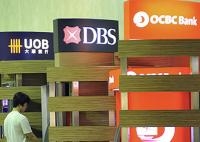
This is how the new property cooling measures will impact the banks
Given that UOB has the largest mortgage exposure, there may be near-term pressure on share price, says DBS.
Here's more from DBS Vickers:
LTV lowered based on loan tenure. MAS will impose a limit of 35 years on all loans for residential property (HDB and private), applying to both individual and nonindividual borrowers, as well as refinancing loans.
MAS will also lower LTV for new residential property for individual borrowers if the tenure exceeds 30 years, or if the loan period extends beyond the retirement age of 65 years.
These measures will be effective from 6 Oct 2012. Banks have not disclosed mortgage loan tenures in their books but it was reported in Business Times that over 45% of new home loans have tenures exceeding 30 years.
Mortgage loan growth down from peak in Aug-10. Mortgage loan growth over the past 2 years peaked at 23.4% y-o-y in Aug-10 and 21% in 2010. Based on previous experiences, upon implementation of such measures, mortgage loan applications fell over 2-3 months but subsequently normalised. But it appears that the measures set in Jan-11 saw mortgage loan growth reduce from 23% y-o-y to 14.7% y-o-y in Aug-12.
Mortgage loan growth will continue to slow. We expect mortgage loan growth to gradually moderate for the rest of the year but supported by drawdown from previous mortgage applications.
We forecast mortgage loans to grow at 10% for 2012. FY13-14F mortgage loan growth would likely reduce further as impact of the new measures kick in. As at 2Q12, DBS, OCBC and UOB’s mortgage to total loans stood at 21%, 25% and 29% respectively. Each grew mortgage loans by 9%, 21% and 17% y-o-y respectively as at end 2Q12.
Prefer OCBC over UOB. At current levels, we see limited upside for UOB as we believe positives have largely been priced in. Given that UOB has the largest mortgage exposure, there may be near-term pressure on share price. OCBC’s traction from Great Eastern and Bank of Singapore clearly differentiates itself with UOB.
We believe over the longer term, these operations in OCBC would drive ROEs higher without utilising too much capital.
























 Advertise
Advertise






